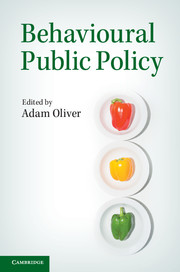Book contents
- Frontmatter
- Contents
- List of Figures
- List of Tables
- List of Contributors
- Introduction
- 1 Ambiguity aversion and the UK government’s response to swine flu
- 2 Models of governance of public services: empirical and behavioural analysis of ‘econs’ and ‘humans’
- 3 From irresponsible knaves to responsible knights for just 5p: behavioural public policy and the environment
- 4 The more who die, the less we care: psychic numbing and genocide
- 5 Healthy habits: some thoughts on the role of public policy in healthful eating and exercise under limited rationality
- 6 Confessing one’s sins but still committing them: transparency and the failure of disclosure
- 7 How should people be rewarded for their work?
- 8 Influencing the financial behaviour of individuals: the mindspace way
- 9 Decision analysis from a neo-Calvinist point of view
- Index
- References
6 - Confessing one’s sins but still committing them: transparency and the failure of disclosure
Published online by Cambridge University Press: 05 June 2014
- Frontmatter
- Contents
- List of Figures
- List of Tables
- List of Contributors
- Introduction
- 1 Ambiguity aversion and the UK government’s response to swine flu
- 2 Models of governance of public services: empirical and behavioural analysis of ‘econs’ and ‘humans’
- 3 From irresponsible knaves to responsible knights for just 5p: behavioural public policy and the environment
- 4 The more who die, the less we care: psychic numbing and genocide
- 5 Healthy habits: some thoughts on the role of public policy in healthful eating and exercise under limited rationality
- 6 Confessing one’s sins but still committing them: transparency and the failure of disclosure
- 7 How should people be rewarded for their work?
- 8 Influencing the financial behaviour of individuals: the mindspace way
- 9 Decision analysis from a neo-Calvinist point of view
- Index
- References
Summary
If financial advisers disclose the fact that they get a bonus if their clients invest in a particular product, how will clients use that information, and to what extent will the disclosure help them make a better decision? If at all, how might the disclosure alter the advice given by advisers, or how might it affect the relationship between advisers and their clients? In this chapter, we address these questions. Reviewing extensive evidence that casts doubt on the efficacy of disclosure, we conclude that disclosure is not a panacea; it often fails to serve its intended functions and may sometimes backfire, hurting the interests of those it was intended to protect.
Conflicts of interest, in which professionals have personal interests that conflict with their professional responsibilities, have been at the heart of many recent business fiascos. For example, the bubble in the American real estate market that burst in 2008 was partly supported by inflated ratings of collateralized mortgage bonds that were created by rating agencies that had financial ties to the issuers of those bonds. Many recent accounting scandals can be traced to conflicts of interest on the part of auditors, who received large consulting fees from the same firms they audited. Likewise, many health care professionals worry that similar problems have been created in medicine because of industry payments to physicians and fee-for-service compensation arrangements.
- Type
- Chapter
- Information
- Behavioural Public Policy , pp. 148 - 164Publisher: Cambridge University PressPrint publication year: 2013
References
- 3
- Cited by

